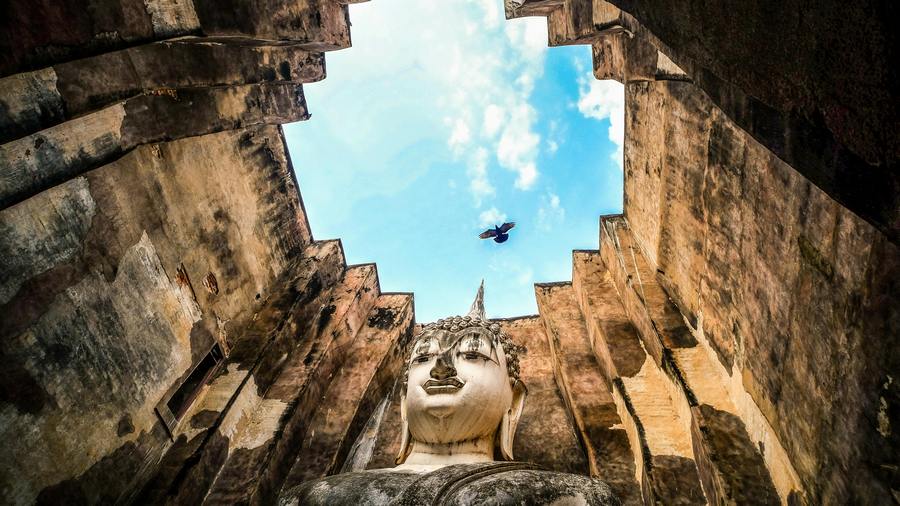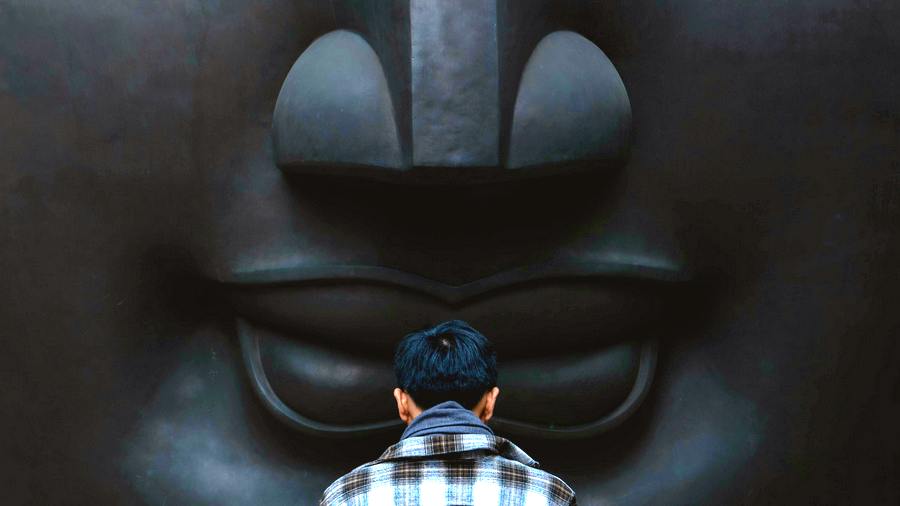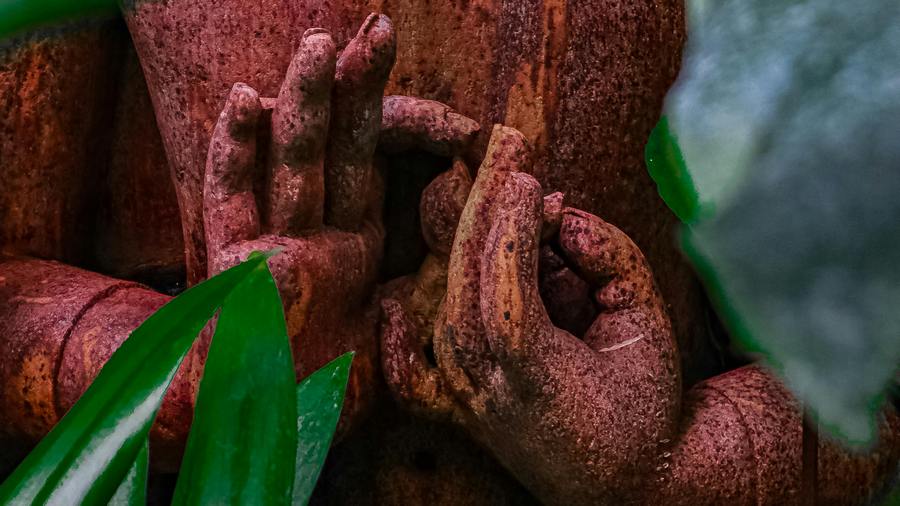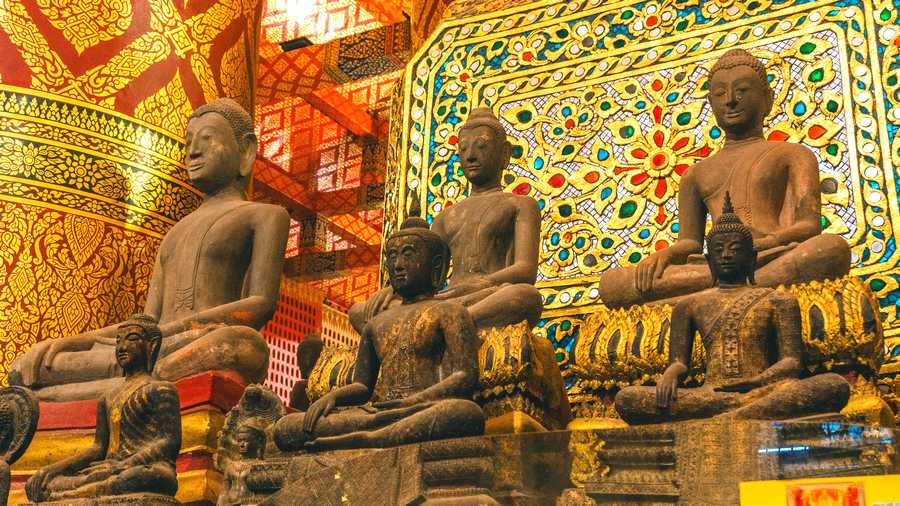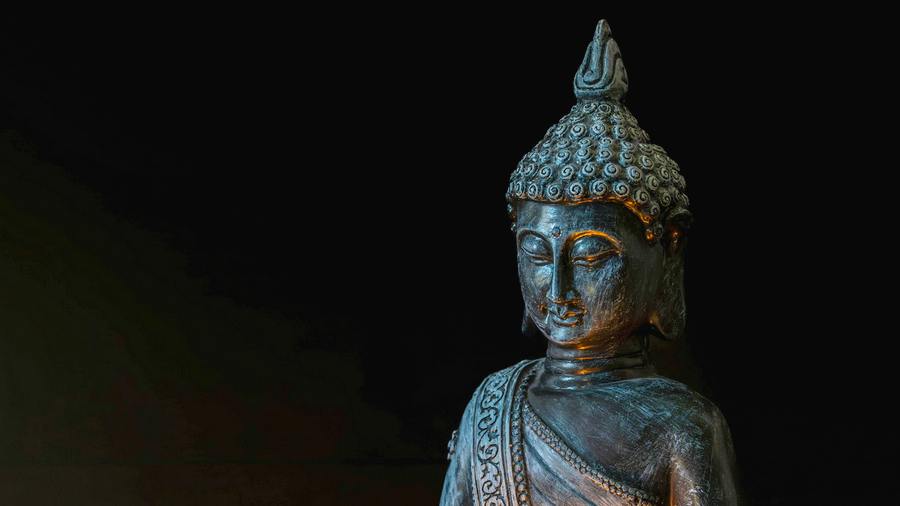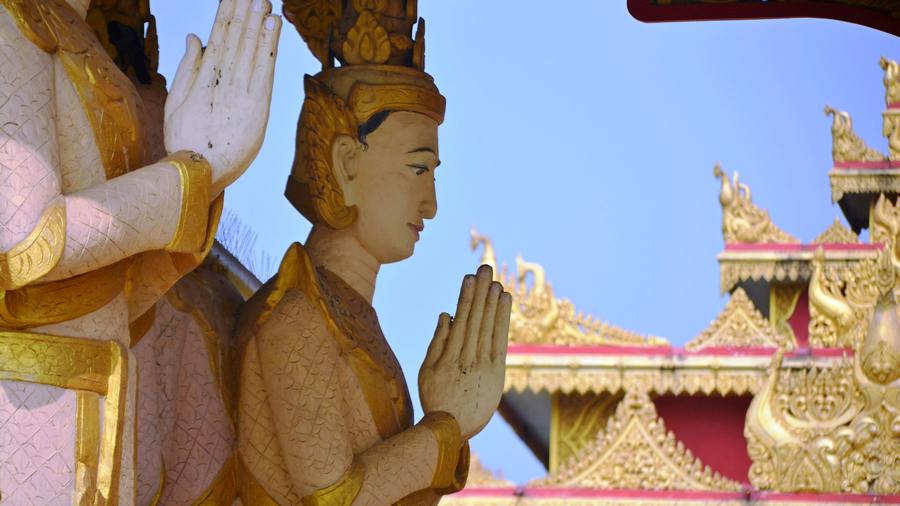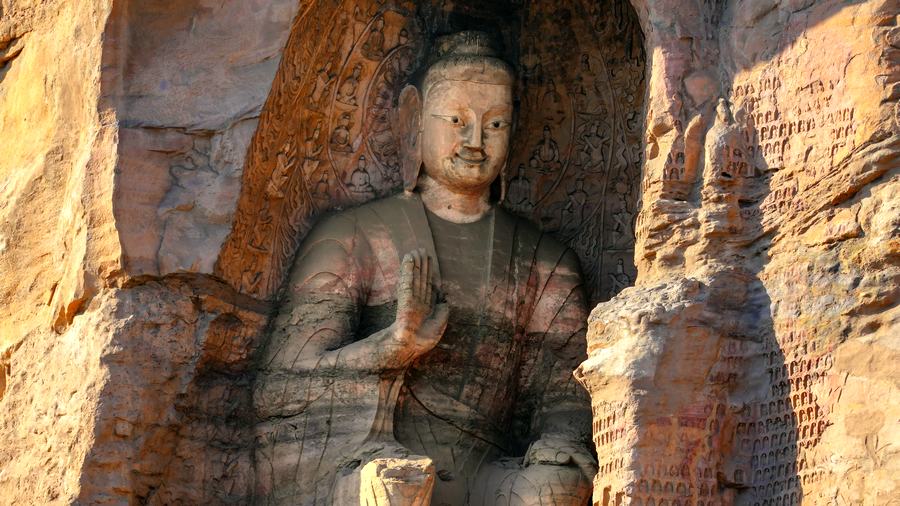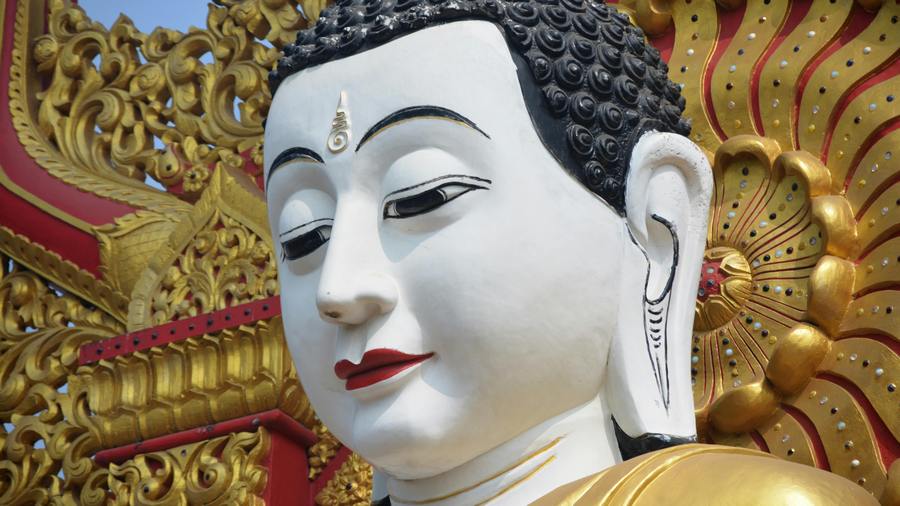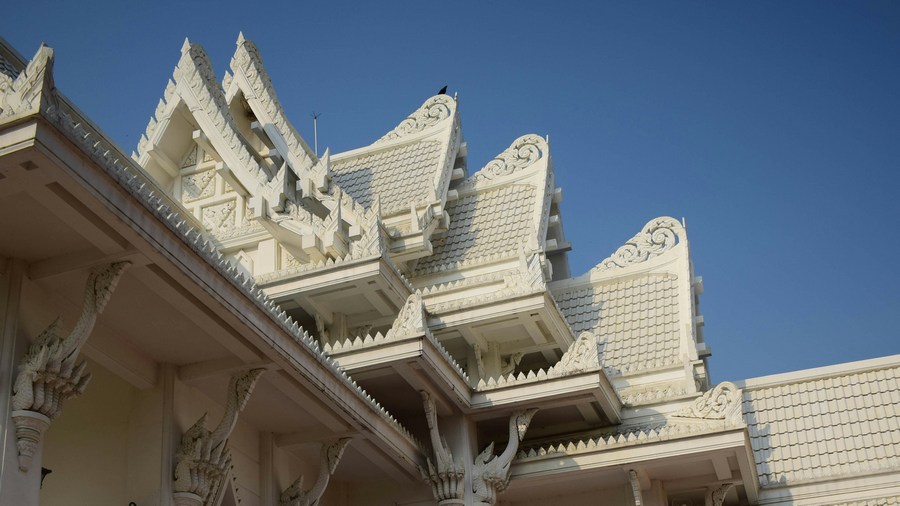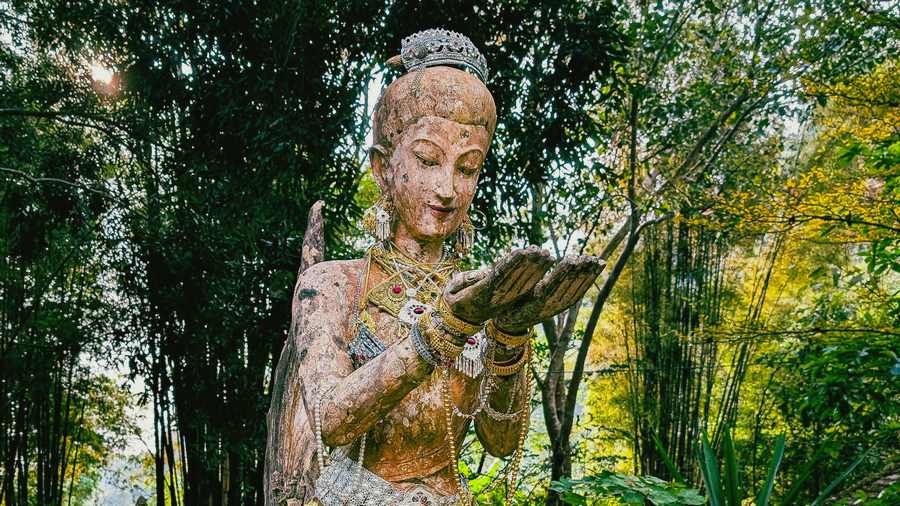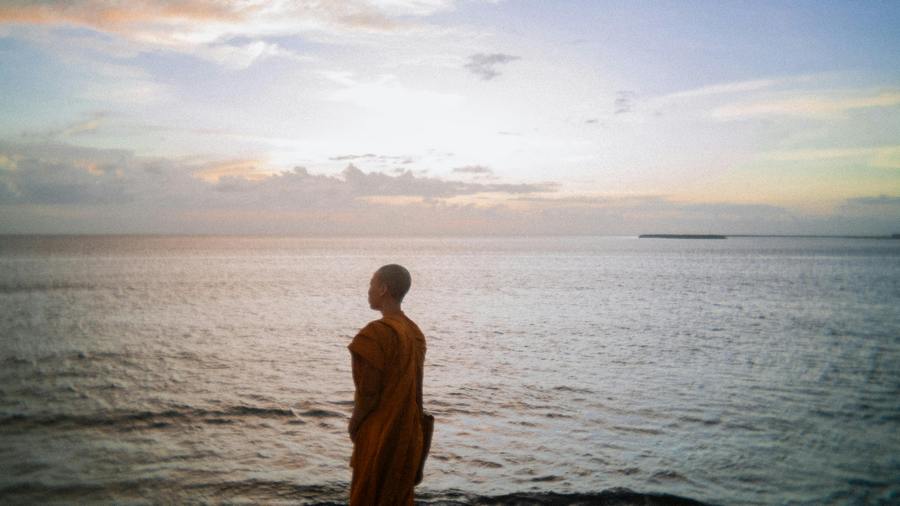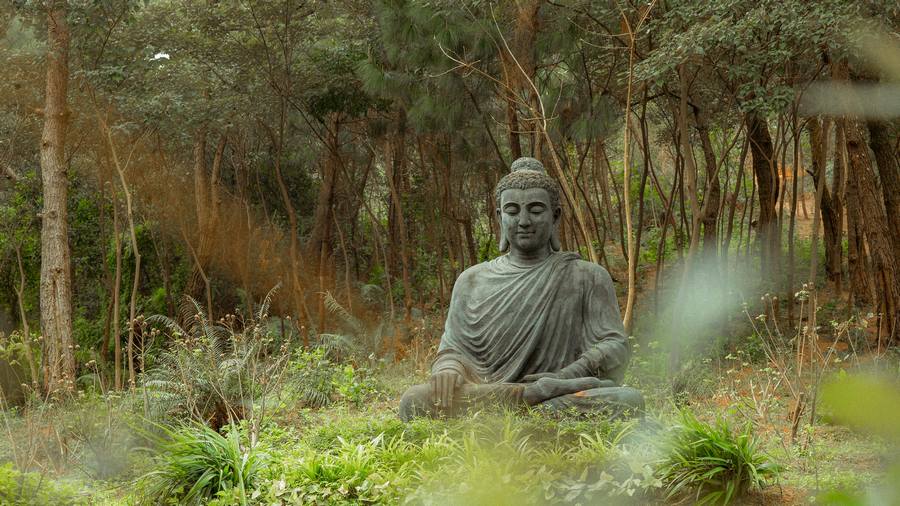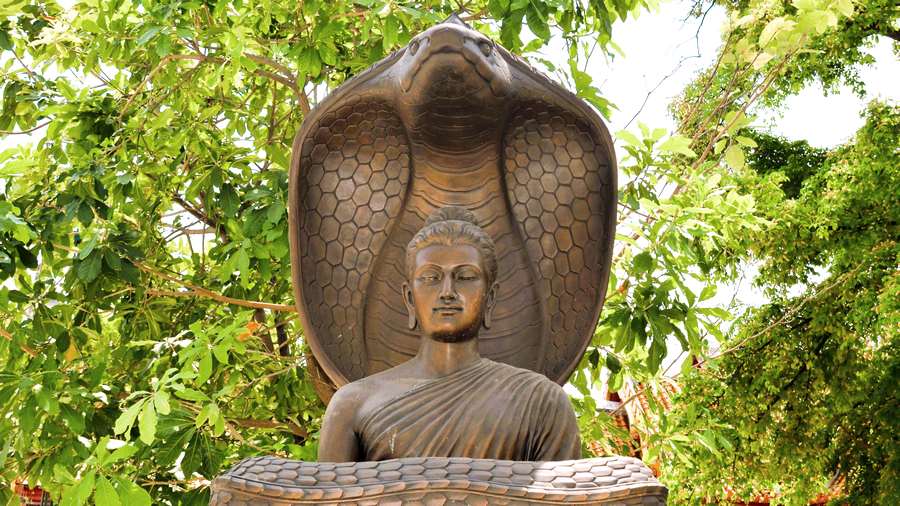[Note: Today’s selection is very long, perhaps 30-45 minutes to read. However it puts dependent origination in a larger context. It might be easier to read directly on the source website: Bhante Bodhi (as seen below), Bhante Sujato, or Ajahn Thanissaro (with a long introduction).]
Setting
Thus have I heard. On one occasion the Blessed One was living at Sāvatthī in Jeta’s Grove, Anāthapiṇḍika’s Park.
Now on that occasion a pernicious view had arisen in a bhikkhu named Sāti, son of a fisherman, thus: “As I understand the Dhamma taught by the Blessed One, it is this same consciousness that runs and wanders through the round of rebirths, not another.”
Several bhikkhus, having heard about this, went to the bhikkhu Sāti and asked him: “Friend Sāti, is it true that such a pernicious view has arisen in you?”
“Exactly so, friends. As I understand the Dhamma taught by the Blessed One, it is this same consciousness that runs and wanders through the round of rebirths, not another.”
Then those bhikkhus, desiring to detach him from that pernicious view, pressed and questioned and cross-questioned him thus: “Friend Sāti, do not say so. Do not misrepresent the Blessed One; it is not good to misrepresent the Blessed One. The Blessed One would not speak thus. For in many ways the Blessed One has stated consciousness to be dependently arisen, since without a condition there is no origination of consciousness.”
Yet although pressed and questioned and cross-questioned by those bhikkhus in this way, the bhikkhu Sāti, son of a fisherman, still obstinately adhered to that pernicious view and continued to insist upon it.
Since the bhikkhus were unable to detach him from that pernicious view, they went to the Blessed One, and after paying homage to him, they sat down at one side and told him all that had occurred, adding: “Venerable sir, since we could not detach the bhikkhu Sāti, son of a fisherman, from this pernicious view, we have reported this matter to the Blessed One.”
Then the Blessed One addressed a certain bhikkhu thus: “Come, bhikkhu, tell the bhikkhu Sāti, son of a fisherman, in my name that the Teacher calls him.”—“Yes, venerable sir,” he replied, and he went to the bhikkhu Sāti and told him: “The Teacher calls you, friend Sāti.”
“Yes, friend,” he replied, and he went to the Blessed One, and after paying homage to him, sat down at one side. The Blessed One then asked him: “Sāti, is it true that the following pernicious view has arisen in you: ‘As I understand the Dhamma taught by the Blessed One, it is this same consciousness that runs and wanders through the round of rebirths, not another’?”
“Exactly so, venerable sir. As I understand the Dhamma taught by the Blessed One, it is this same consciousness that runs and wanders through the round of rebirths, not another.”
“What is that consciousness, Sāti?”
“Venerable sir, it is that which speaks and feels and experiences here and there the result of good and bad actions.”
“Misguided man, to whom have you ever known me to teach the Dhamma in that way? Misguided man, have I not stated in many ways consciousness to be dependently arisen, since without a condition there is no origination of consciousness? But you, misguided man, have misrepresented us by your wrong grasp and injured yourself and stored up much demerit; for this will lead to your harm and suffering for a long time.”
Then the Blessed One addressed the bhikkhus thus: “Bhikkhus, what do you think? Has this bhikkhu Sāti, son of a fisherman, kindled even a spark of wisdom in this Dhamma and Discipline?”
“How could he, venerable sir? No, venerable sir.”
When this was said, the bhikkhu Sāti, son of a fisherman, sat silent, dismayed, with shoulders drooping and head down, glum, and without response. Then, knowing this, the Blessed One told him: “Misguided man, you will be recognised by your own pernicious view. I shall question the bhikkhus on this matter.”
Then the Blessed One addressed the bhikkhus thus: “Bhikkhus, do you understand the Dhamma taught by me as this bhikkhu Sāti, son of a fisherman, does when he misrepresents us by his wrong grasp and injures himself and stores up much demerit?”
“No, venerable sir. For in many discourses the Blessed One has stated consciousness to be dependently arisen, since without a condition there is no origination of consciousness.”
“Good, bhikkhus. It is good that you understand the Dhamma taught by me thus. For in many ways I have stated consciousness to be dependently arisen, since without a condition there is no origination of consciousness. But this bhikkhu Sāti, son of a fisherman, misrepresents us by his wrong grasp and injures himself and stores up much demerit; for this will lead to the harm and suffering of this misguided man for a long time.
Conditionality of Consciousness
“Bhikkhus, consciousness is reckoned by the particular condition dependent upon which it arises. When consciousness arises dependent on the eye and forms, it is reckoned as eye-consciousness; when consciousness arises dependent on the ear and sounds, it is reckoned as ear-consciousness; when consciousness arises dependent on the nose and odours, it is reckoned as nose-consciousness; when consciousness arises dependent on the tongue and flavours, it is reckoned as tongue-consciousness; when consciousness arises dependent on the body and tangibles, it is reckoned as body-consciousness; when consciousness arises dependent on the mind and mind-objects, it is reckoned as mind-consciousness. Just as fire is reckoned by the particular condition dependent on which it burns—when fire burns dependent on logs, it is reckoned as a log fire; when fire burns dependent on sticks, it is reckoned as a stick fire; when fire burns dependent on grass, it is reckoned as a grass fire; when fire burns dependent on cowdung, it is reckoned as a cowdung fire; when fire burns dependent on chaff, it is reckoned as a chaff fire; when fire burns dependent on rubbish, it is reckoned as a rubbish fire—so too, consciousness is reckoned by the particular condition dependent on which it arises. When consciousness arises dependent on the eye and forms, it is reckoned as eye-consciousness…when consciousness arises dependent on the mind and mind-objects, it is reckoned as mind-consciousness.
General Questionnaire on Being
“Bhikkhus, do you see: ‘This has come to be’?”—“Yes, venerable sir.”—“Bhikkhus, do you see: ‘Its origination occurs with that as nutriment’?”—“Yes, venerable sir.”—“Bhikkhus, do you see: ‘With the cessation of that nutriment, what has come to be is subject to cessation’?”—“Yes, venerable sir.”
“Bhikkhus, does doubt arise when one is uncertain thus: ‘Has this come to be’?”—“Yes, venerable sir.”—“Bhikkhus, does doubt arise when one is uncertain thus: ‘Does its origination occur with that as nutriment’?”—“Yes, venerable sir.”—“Bhikkhus, does doubt arise when one is uncertain thus: ‘With the cessation of that nutriment, is what has come to be subject to cessation’?”—“Yes, venerable sir.”
“Bhikkhus, is doubt abandoned in one who sees as it actually is with proper wisdom thus: ‘This has come to be’?”—“Yes, venerable sir.”—“Bhikkhus, is doubt abandoned in one who sees as it actually is with proper wisdom thus: ‘Its origination occurs with that as nutriment’?”—“Yes, venerable sir.”—“Bhikkhus, is doubt abandoned in one who sees as it actually is with proper wisdom thus: ‘With the cessation of that nutriment, what has come to be is subject to cessation’?”—“Yes, venerable sir.”
“Bhikkhus, are you thus free from doubt here: ‘This has come to be’?”—“Yes, venerable sir.”—“Bhikkhus, are you thus free from doubt here: ‘Its origination occurs with that as nutriment’?” —“Yes, venerable sir.”—“Bhikkhus, are you thus free from doubt here: ‘With the cessation of that nutriment, what has come to be is subject to cessation’?”—“Yes, venerable sir.”
“Bhikkhus, has it been seen well by you as it actually is with proper wisdom thus: ‘This has come to be’?”—“Yes, venerable sir.”—“Bhikkhus, has it been seen well by you as it actually is with proper wisdom thus: ‘Its origination occurs with that as nutriment’?”—“Yes, venerable sir.”—“Bhikkhus, has it been seen well by you as it actually is with proper wisdom thus: ‘With the cessation of that nutriment, what has come to be is subject to cessation’?”—“Yes, venerable sir.”
“Bhikkhus, purified and bright as this view is, if you adhere to it, cherish it, treasure it, and treat it as a possession, would you then understand that the Dhamma has been taught as similar to a raft, being for the purpose of crossing over, not for the purpose of grasping?”—“No, venerable sir.”—“Bhikkhus, purified and bright as this view is, if you do not adhere to it, cherish it, treasure it, and treat it as a possession, would you then understand that the Dhamma has been taught as similar to a raft, being for the purpose of crossing over, not for the purpose of grasping?”—“Yes, venerable sir.”
Nutriment and Dependent Origination
“Bhikkhus, there are these four kinds of nutriment for the maintenance of beings that already have come to be and for the support of those about to come to be. What four? They are: physical food as nutriment, gross or subtle; contact as the second; mental volition as the third; and consciousness as the fourth.
“Now, bhikkhus, these four kinds of nutriment have what as their source, what as their origin, from what are they born and produced? These four kinds of nutriment have craving as their source, craving as their origin; they are born and produced from craving. And this craving has what as its source…? Craving has feeling as its source…And this feeling has what as its source…? Feeling has contact as its source…And this contact has what as its source…? Contact has the sixfold base as its source…And this sixfold base has what as its source…? The sixfold base has mentality-materiality as its source…And this mentality-materiality has what as its source…? Mentality-materiality has consciousness as its source…And this consciousness has what as its source…? Consciousness has formations as its source…And these formations have what as their source, what as their origin, from what are they born and produced? Formations have ignorance as their source, ignorance as their origin; they are born and produced from ignorance.
Forward Exposition on Arising
“So, bhikkhus, with ignorance as condition, formations come to be; with formations as condition, consciousness; with consciousness as condition, mentality-materiality; with mentality-materiality as condition, the sixfold base; with the sixfold base as condition, contact; with contact as condition, feeling; with feeling as condition, craving; with craving as condition, clinging; with clinging as condition, being; with being as condition, birth; with birth as condition, ageing and death, sorrow, lamentation, pain, grief, and despair come to be. Such is the origin of this whole mass of suffering.
Reverse Order Questionnaire on Arising
“‘With birth as condition, ageing and death’: so it was said. Now, bhikkhus, do ageing and death have birth as condition or not, or how do you take it in this case?”
“Ageing and death have birth as condition, venerable sir. Thus we take it in this case: ‘With birth as condition, ageing and death.’”
“‘With being as condition, birth’: so it was said. Now, bhikkhus, does birth have being as condition or not, or how do you take it in this case?”
“Birth has being as condition, venerable sir. Thus we take it in this case: ‘With being as condition, birth.’”
“‘With clinging as condition, being’: so it was said. Now, bhikkhus, does being have clinging as condition or not, or how do you take it in this case?”
“Being has clinging as condition, venerable sir. Thus we take it in this case: ‘With clinging as condition, being.’”
“‘With craving as condition, clinging’: so it was said. Now, bhikkhus, does clinging have craving as condition or not, or how do you take it in this case?”
“Clinging has craving as condition, venerable sir. Thus we take it in this case: ‘With craving as condition, clinging.’”
“‘With feeling as condition, craving’: so it was said. Now, bhikkhus, does craving have feeling as condition or not, or how do you take it in this case?”
“Craving has feeling as condition, venerable sir. Thus we take it in this case: ‘With feeling as condition, craving.’”
“‘With contact as condition, feeling’: so it was said. Now, bhikkhus, does feeling have contact as condition or not, or how do you take it in this case?”
“Feeling has contact as condition, venerable sir. Thus we take it in this case: ‘With contact as condition, feeling.’”
“‘With the sixfold base as condition, contact’: so it was said. Now, bhikkhus, does contact have the sixfold base as condition or not, or how do you take it in this case?”
“Contact has the sixfold base as condition, venerable sir. Thus we take it in this case: ‘With the sixfold base as condition, contact.’”
“‘With mentality-materiality as condition, the sixfold base’: so it was said. Now, bhikkhus, does the sixfold base have mentality-materiality as condition or not, or how do you take it in this case?”
“The sixfold base has mentality-materiality as condition, venerable sir. Thus we take it in this case: ‘With mentality-materiality as condition, the sixfold base.’”
“‘With consciousness as condition, mentality-materiality’: so it was said. Now, bhikkhus, does mentality-materiality have consciousness as condition or not, or how do you take it in this case?”
“Mentality-materiality has consciousness as condition, venerable sir. Thus we take it in this case: ‘With consciousness as condition, mentality-materiality.’”
“‘With formations as condition, consciousness’: so it was said. Now, bhikkhus, does consciousness have formations as condition or not, or how do you take it in this case?”
“Consciousness has formations as condition, venerable sir. Thus we take it in this case: ‘With formations as condition, consciousness.’”
“‘With ignorance as condition, formations’: so it was said. Now, bhikkhus, do formations have ignorance as condition or not, or how do you take it in this case?”
“Formations have ignorance as condition, venerable sir. Thus we take it in this case: ‘With ignorance as condition, formations. ’”
Recapitulation on Arising
“Good, bhikkhus. So you say thus, and I also say thus: ‘When this exists, that comes to be; with the arising of this, that arises.’ That is, with ignorance as condition, formations come to be; with formations as condition, consciousness; with consciousness as condition, mentality-materiality; with mentality-materiality as condition, the sixfold base; with the sixfold base as condition, contact; with contact as condition, feeling; with feeling as condition, craving; with craving as condition, clinging; with clinging as condition, being; with being as condition, birth; with birth as condition, ageing and death, sorrow, lamentation, pain, grief, and despair come to be. Such is the origin of this whole mass of suffering.
Forward Exposition on Cessation
“But with the remainderless fading away and cessation of ignorance comes cessation of formations; with the cessation of formations, cessation of consciousness; with the cessation of consciousness, cessation of mentality-materiality; with the cessation of mentality-materiality, cessation of the sixfold base; with the cessation of the sixfold base, cessation of contact; with the cessation of contact, cessation of feeling; with the cessation of feeling, cessation of craving; with the cessation of craving, cessation of clinging; with the cessation of clinging, cessation of being; with the cessation of being, cessation of birth; with the cessation of birth, ageing and death, sorrow, lamentation, pain, grief, and despair cease. Such is the cessation of this whole mass of suffering.
Reverse Order Questionnaire on Cessation
“‘With the cessation of birth, cessation of ageing and death’: so it was said. Now, bhikkhus, do ageing and death cease with the cessation of birth or not, or how do you take it in this case?”
“Ageing and death cease with the cessation of birth, venerable sir. Thus we take it in this case: ‘With the cessation of birth, cessation of ageing and death.’”
“‘With the cessation of being, cessation of birth’…‘With the cessation of clinging, cessation of being’…‘With the cessation of craving, cessation of clinging’…‘With the cessation of feeling, cessation of craving’…‘With the cessation of contact, cessation of feeling’ …’With the cessation of the sixfold base, cessation of contact’…‘With the cessation of mentality-materiality, cessation of the sixfold base’…‘With the cessation of consciousness, cessation of mentality-materiality’…‘With the cessation of formations, cessation of consciousness’…‘With the cessation of ignorance, cessation of formations’: so it was said. Now, bhikkhus, do formations cease with the cessation of ignorance or not, or how do you take it in this case?”
“Formations cease with the cessation of ignorance, venerable sir. Thus we take it in this case: ‘With the cessation of ignorance, cessation of formations.’”
Recapitulation on Cessation
“Good, bhikkhus. So you say thus, and I also say thus: ‘When this does not exist, that does not come to be; with the cessation of this, that ceases.’ That is, with the cessation of ignorance comes cessation of formations; with the cessation of formations, cessation of consciousness; with the cessation of consciousness, cessation of mentality-materiality; with the cessation of mentality-materiality, cessation of the sixfold base; with the cessation of the sixfold base, cessation of contact; with the cessation of contact, cessation of feeling; with the cessation of feeling, cessation of craving; with the cessation of craving, cessation of clinging; with the cessation of clinging, cessation of being; with the cessation of being, cessation of birth; with the cessation of birth, ageing and death, sorrow, lamentation, pain, grief, and despair cease. Such is the cessation of this whole mass of suffering.
Personal Knowledge
“Bhikkhus, knowing and seeing in this way, would you run back to the past thus: ‘Were we in the past? Were we not in the past? What were we in the past? How were we in the past? Having been what, what did we become in the past?’?”—“No, venerable sir.”—“Knowing and seeing in this way, would you run forward to the future thus: ‘Shall we be in the future? Shall we not be in the future? What shall we be in the future? How shall we be in the future? Having been what, what shall we become in the future?’?”—“No, venerable sir.”—“Knowing and seeing in this way, would you now be inwardly perplexed about the present thus: ‘Am I? Am I not? What am I? How am I? Where has this being come from? Where will it go?’?”—“No, venerable sir.”
“Bhikkhus, knowing and seeing in this way, would you speak thus: ‘The Teacher is respected by us. We speak as we do out of respect for the Teacher’?”—“No, venerable sir.”—“Knowing and seeing in this way, would you speak thus: ‘The Recluse says this, and we speak thus at the bidding of the Recluse’?”—“No, venerable sir.”—“Knowing and seeing in this way, would you acknowledge another teacher?”—“No, venerable sir.”—“Knowing and seeing in this way, would you return to the observances, tumultuous debates, and auspicious signs of ordinary recluses and brahmins, taking them as the core of the holy life?”—“No, venerable sir.”—“Do you speak only of what you have known, seen, and understood for yourselves?” —“Yes, venerable sir.”
“Good, bhikkhus. So you have been guided by me with this Dhamma, which is visible here and now, immediately effective, inviting inspection, onward leading, to be experienced by the wise for themselves. For it was with reference to this that it has been said: ‘Bhikkhus, this Dhamma is visible here and now, immediately effective, inviting inspection, onward leading, to be experienced by the wise for themselves.’
The Round of Existence: Conception to Maturity
“Bhikkhus, the descent of the embryo takes place through the union of three things. Here, there is the union of the mother and father, but the mother is not in season, and the gandhabba is not present—in this case no descent of an embryo takes place. Here, there is the union of the mother and father, and the mother is in season, but the gandhabba is not present—in this case too no descent of the embryo takes place. But when there is the union of the mother and father, and the mother is in season, and the gandhabba is present, through the union of these three things the descent of the embryo takes place.
“The mother then carries the embryo in her womb for nine or ten months with much anxiety, as a heavy burden. Then, at the end of nine or ten months, the mother gives birth with much anxiety, as a heavy burden. Then, when the child is born, she nourishes it with her own blood; for the mother’s breast-milk is called blood in the Noble One’s Discipline.
“When he grows up and his faculties mature, the child plays at such games as toy ploughs, tipcat, somersaults, toy windmills, toy measures, toy carts, and a toy bow and arrow.
“When he grows up and his faculties mature still further, the youth enjoys himself provided and endowed with the five cords of sensual pleasure, with forms cognizable by the eye… sounds cognizable by the ear…odours cognizable by the nose… flavours cognizable by the tongue…tangibles cognizable by the body that are wished for, desired, agreeable and likeable, connected with sensual desire, and provocative of lust.
The Continuation of the Round
“On seeing a form with the eye, he lusts after it if it is pleasing; he dislikes it if it is unpleasing. He abides with mindfulness of the body unestablished, with a limited mind, and he does not understand as it actually is the deliverance of mind and deliverance by wisdom wherein those evil unwholesome states cease without remainder. Engaged as he is in favouring and opposing, whatever feeling he feels—whether pleasant or painful or neither-painful-nor-pleasant—he delights in that feeling, welcomes it, and remains holding to it. As he does so, delight arises in him. Now delight in feelings is clinging. With his clinging as condition, being comes to be; with being as condition, birth; with birth as condition, ageing and death, sorrow, lamentation, pain, grief, and despair come to be. Such is the origin of this whole mass of suffering.
“On hearing a sound with the ear…On smelling an odour with the nose…On tasting a flavour with the tongue…On touching a tangible with the body…On cognizing a mind-object with the mind, he lusts after it if it is pleasing; he dislikes it if it is unpleasing…Now delight in feelings is clinging. With his clinging as condition, being comes to be; with being as condition, birth; with birth as condition, ageing and death, sorrow, lamentation, pain, grief, and despair come to be. Such is the origin of this whole mass of suffering.
The Ending of the Round: The Gradual Training
“Here, bhikkhus, a Tathāgata appears in the world, accomplished, fully enlightened…(You can read the section on the gradual training starting here and going to paragraph 28)…he purifies his mind from doubt.
“Having thus abandoned these five hindrances, imperfections of the mind that weaken wisdom, quite secluded from sensual pleasures, secluded from unwholesome states, he enters upon and abides in the first jhāna…With the stilling of applied and sustained thought, he enters upon and abides in the second jhāna…With the fading away as well of rapture…he enters upon and abides in the third jhāna…With the abandoning of pleasure and pain…he enters upon and abides in the fourth jhāna…which has neither-pain-nor-pleasure and purity of mindfulness due to equanimity.
The Ending of the Round: Full Cessation
“On seeing a form with the eye, he does not lust after it if it is pleasing; he does not dislike it if it is unpleasing. He abides with mindfulness of the body established, with an immeasurable mind, and he understands as it actually is the deliverance of mind and deliverance by wisdom wherein those evil unwholesome states cease without remainder. Having thus abandoned favouring and opposing, whatever feeling he feels, whether pleasant or painful or neither-painful-nor-pleasant, he does not delight in that feeling, welcome it, or remain holding to it. As he does not do so, delight in feelings ceases in him. With the cessation of his delight comes cessation of clinging; with the cessation of clinging, cessation of being; with the cessation of being, cessation of birth; with the cessation of birth, ageing and death, sorrow, lamentation, pain, grief, and despair cease. Such is the cessation of this whole mass of suffering.
“On hearing a sound with the ear…On smelling an odour with the nose…On tasting a flavour with the tongue…On touching a tangible with the body…On cognizing a mind-object with the mind, he does not lust after it if it is pleasing; he does not dislike it if it is unpleasing…With the cessation of his delight comes cessation of clinging; with the cessation of clinging, cessation of being; with the cessation of being, cessation of birth; with the cessation of birth, ageing and death, sorrow, lamentation, pain, grief, and despair cease. Such is the cessation of this whole mass of suffering.
Conclusion
“Bhikkhus, remember this discourse of mine briefly as deliverance in the destruction of craving; but remember the bhikkhu Sāti, son of a fisherman, as caught up in a vast net of craving, in the trammel of craving.”
That is what the Blessed One said. The bhikkhus were satisfied and delighted in the Blessed One’s words.
Read this translation of Majjhima Nikāya 38 Mahātaṇhāsaṅkhayasutta: The Greater Discourse on the Destruction of Craving by Bhikkhu Bodhi on SuttaCentral.net. Or read a different translation on SuttaCentral.net or DhammaTalks.org. Or listen on PaliAudio.com or SC-Voice.net. Or explore the Pali on DigitalPaliReader.online.
Or read a translation in Deutsch, Русский, বাংলা, Català, Čeština, Español, Français, हिन्दी, Magyar, Bahasa Indonesia, Italiano, 日本語, 한국어/조선말, မြန်မာဘာသာ, Norsk, Polski, Português, සිංහල, Slovenščina, Srpski, ไทย, Tiếng Việt, or 汉语. Learn how to find your language.


 Copyright: Creative Commons Zero (CC0) To the extent possible under law, Bhikkhu Sujato has waived all copyright and related or neighboring rights to his own translations on
Copyright: Creative Commons Zero (CC0) To the extent possible under law, Bhikkhu Sujato has waived all copyright and related or neighboring rights to his own translations on 


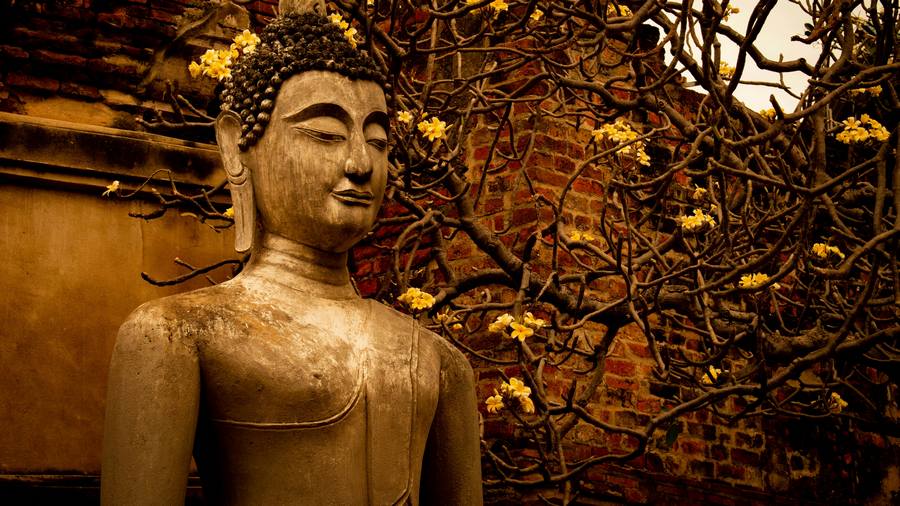



 All translations on this site by Bhikkhu Bodhi are licensed under a Creative Commons Attribution-NonCommercial-NoDerivs 3.0 Unported License.
Bhikkhu Bodhi, The Middle Length Discourses of the Buddha (Wisdom Publications, 2009), The Connected Discourses of the Buddha (Wisdom Publications, 2000), The Numerical Discourses of the Buddha (Wisdom Publications, 2012).
All translations on this site by Bhikkhu Bodhi are licensed under a Creative Commons Attribution-NonCommercial-NoDerivs 3.0 Unported License.
Bhikkhu Bodhi, The Middle Length Discourses of the Buddha (Wisdom Publications, 2009), The Connected Discourses of the Buddha (Wisdom Publications, 2000), The Numerical Discourses of the Buddha (Wisdom Publications, 2012).



